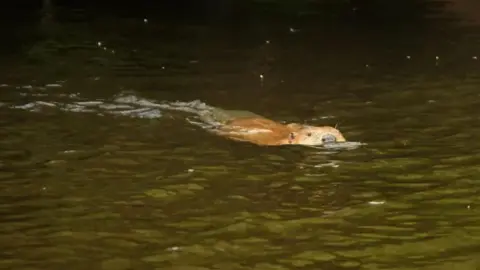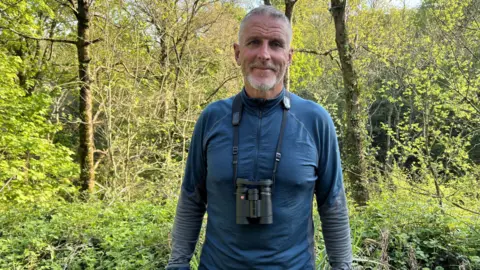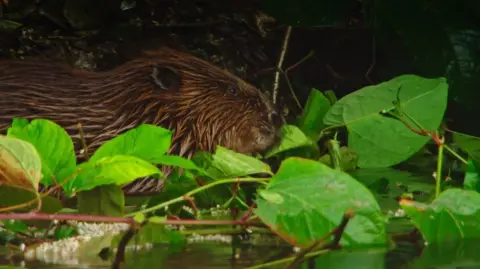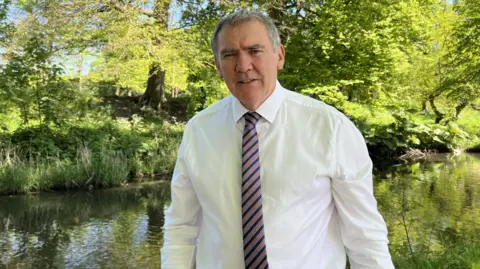This is the moment a wild beaver is filmed on banks of River Dyfi
A wild beaver has been filmed on a river in Wales in what has been described as a "hugely significant" sighting.
Beavers disappeared from Britain about 400 years ago after being hunted to extinction, but in the past two decades they have been making a comeback.
Naturalist and presenter Iolo Williams, who encountered the wild beaver on the River Dyfi near Machynlleth, said the clear and prolonged sighting was one of the "very, very best" things he had ever witnessed.
There are four managed enclosures that house beavers in Wales, and an unknown number living in the wild.
"I've seen some incredible wildlife in Wales, some amazing things, but this ranks up there, not just with the best, but as the very, very best," said Williams, who captured the moment as part of his BBC series Iolo's River Valleys.
"The last people to see wild beaver in Wales would have been the Welsh princes, who would have hunted them.
"So they've been absent for hundreds of years. So it's hugely significant."

 Iolo's River Valleys, BBC
Iolo's River Valleys, BBC
The beaver was described as "very chill"
In Wales, it is an offence to release beavers into open rivers without a licence, and Natural Resources Wales (NRW) said no licences of this type had been issued.
In England, where the government recently approved beavers' reintroduction to the wild, it is thought that there are about 500 of them - some in the wild and others in enclosures.
In Scotland, which began reintroducing beavers to the wild several years ago, it is thought that there are now more than 1,500.
"We had information that a beaver had been seen on this section of the River Dyfi, and we were told to get to this particular site at 18:00 and the beaver will be there," said Williams.
"We had gone out a few days before, and it poured with rain and we'd seen nothing.
"And I must admit, I was thinking, we're not going to get it.
"But then when we went on the first dry day, 18:00, and the beaver was there."


Iolo Williams and his crew caught the beaver on camera while filming a new series
Williams said the beaver "didn't pay us any attention at all".
"It was very chill," he added.
"We were on the opposite bank, and we thought we better be quiet, don't move around. And the beaver just saw us and it just carried on feeding and swam."
Local people have reported seeing the beaver, and others, on the same stretch of the River Dyfi multiple times in recent years.
But exactly where they have come from remains a mystery, after a nearby beaver enclosure ruled out any escapes.
Beaver family
Alicia Leow-Dyke, from Wildlife Trust Wales, said there was evidence of the semi-aquatic animals breeding along the waterway.
"On this occasion we know it's one family. It could be two families - one family split into two," she said.
"There has been evidence of breeding on the river. Youngsters have been spotted on the river over the years.
"Beavers only breed once a year and their litters are pretty small - two to three within a litter. So a beaver family could be anything from two adults, to five or eight if you include the young."

 Iolo's River Valleys
Iolo's River Valleys
The beaver could be part of a family living in mid-Wales, according to the Wildlife Trust
Last year the Welsh government said it was considering introducing legislation to protect beavers, as wildlife charities called for them to be released into Wales' rivers.
Dr Robert Needham, from the Beaver Trust, said their reintroduction could bring substantial benefits, describing them as "ecosystem engineer[s]".
"What this means is that the sort of habitat modification that beavers can do through damming, building lodges, digging canals - this can create habitats for other species, and they can increase biodiversity," said Dr Needham.
"They can help restore our wetland habitats, which are massively lost throughout Europe, let alone Great Britain.
"They can help alleviate flooding with the dams that they create, particularly in headwater streams, they hold that water back, releasing it slowly. So we see a reduction in peak flow events, during storm events. But this can also be really beneficial to villages and society during summer periods, during drought conditions."
But not everyone believes that reintroducing beavers to the wild is a good thing.
Critics say their dams can flood and waterlog fields while the animals themselves can feed on certain agricultural crops and damage trees.


NFU Cymru's Aled Jones has concerns about beavers living in the wild
"Fundamentally, there are issues. There are cases where river banks will fall in and the impact of flooding, particularly on on good farmland as well," said Aled Jones, president of NFU Cymru.
"The management [of beavers] is crucial. We can't allow an indiscriminate approach where farming businesses are severely impacted.
"So we have to have control measures because this is their livelihoods. And we have to remember this is where farmers make their living, and anything negatively impacting that, if they're losing their crops because of flooding, who pays?"
Iolo's River Valleys will be broadcast on BBC Two and BBC One Wales on 6 May at 19:00 and will also be available on BBC iPlayer.
.png)
 7 months ago
23
7 months ago
23








 English (US) ·
English (US) ·